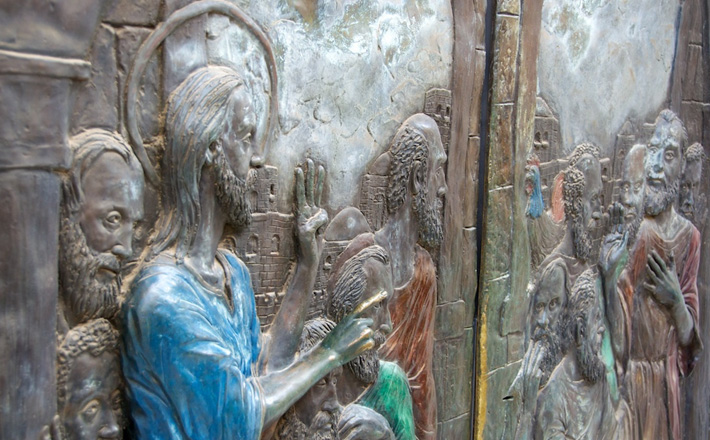Commentary on Isaiah 50:4-9a
The lectionary selection constitutes the third of four so-called “Suffering Servant” songs that appear in Deutero-Isaiah.
The other three songs appear in Isaiah 42:1-4; 49:1-6 and 52:13-53:12.
Scholarly debates about the identity of the Servant persist. Traditional Jewish interpretation identifies the Servant with the suffering nation of ancient Israel while other scholars posit that the Servant was the prophet himself.1
Since early in the church’s history, however, interpreters have seen in the Servant the figure of Jesus Christ,2 and that opinion perseveres in the works of some contemporary scholars who are open to an understanding of biblical inspiration that includes “predictive prophecy.” For example, John N. Oswald, no mean biblical scholar, remarks on verse 5 by noting that, among the company of biblical prophets, all reacted negatively to the things their calling required of him. “Yet,” Oswald writes, “this man calmly says he never did.” Oswald continues: “Who can be intended here? Only one other prophet in Israel’s history said anything similar — Jesus bar-Joseph (John 8:29).”3
Whether is it is possible or desirable to return to an earlier, pre-critical understanding of biblical prophecy is beyond the scope of the present discussion save this, my modest claim: Jesus Christ certainly did fulfill Old Testament prophecy in the sense that the older texts were filled full of new meaning in the light of the Christ event. The alignment of the third Servant Song on Passion Sunday is a case in point. Whomever the Servant was in the context of the 6th century prophet, the lectionary’s juxtaposition of this text with Jesus’ looming passion casts the shadow of a cross over the Servant’s song. The indignities suffered by the Servant in verse 6 become the story of Jesus’ passion.
On further reflection, however, this song turns out to concern itself less with the Servant and his suffering and more with the one whom he addresses as “the Lord GOD” (’adonay Yahweh). Of the eight instances of that title in Deutero-Isaiah, four of them occur in these verses (Isaiah 50:4, 5, 7, 9).4
What is it, then, that the ’adonay Yahweh does in this short poem?
First, the Lord GOD has formed the speaker into a “teacher,” giving him the ability to sustain the weary with a word (verse 4). Indeed, nowhere in this poem does the poet describe himself as a servant (’ebed). He is rather among the “learned” (limmudim). That plural noun occurs at the end of verse 4, a fact made clearer in the KJV: “The Lord GOD hath given me the tongue of the learned … he wakeneth mine ear to hear as the learned. The adjective suggests that the one who is taught is a disciple, hence the NJB’s translation of “a disciple’s tongue … to listen like a disciple.”
The image that emerges, therefore, is of a Lord GOD who has called this individual not once but daily, “morning by morning.” Each day the Lord GOD wakens his ear and opens that ear to hear (verse 5). All of this is without the poet’s resistance or turning aside and done precisely so that the Lord GOD might sustain the weary and those in want through this learned disciple.
The motive for the enemies’ violence is left unspoken. Perhaps it is inevitably the case that when the embodied word of God comes among people, when a message of grace comes to a people who will have redemption on their own terms or not at all, then ferocious rejection is inevitable. If so, here is another instance where Jesus’ story is filled full of meaning in light of the prophetic oracle.
Second, it is clear that the Lord GOD has not abandoned the poet. “The Lord God helps me,” he declares both in verse 7 and 9. The face that is spit upon and insulted (mikkelimmoth, a noun derived from the verbal root kalam, verse 6) is the very face that is “set like flint” and not shamed (niklameti, from that same root kalam, verse7). The Servant’s confidence rests in the proximity of “he who vindicates me” (literally, ‘the one who makes me righteous’). No one can contend against him in a court of law nor, one supposes, in the court of public opinion, since God has justified him. Paul makes a similar claim in Romans 8:31-39.
Given that this short poem is about the activities of the Lord GOD, we might suppose that it is not only Jesus but we ourselves who are instructed as disciples and summoned to sustain the weary with a word. It is good to waive our palm branches and wish Jesus well as he starts his way to the cross, but Jesus summons us to do more. We are to go with him fully prepared and willing to suffer.
Like the Servant, Jesus’ disciples know that we worship a God of mercy, justice, and love. Speaking a word to those wearied by the absence of those divine qualities has, however, become more frightening. Those that would welcome the immigrant, for example, or those who might speak against racism, misogyny, and homophobia are increasingly subject to the same violence as that experienced by those wearied ones. Blows, insults and spittle — not to mention bullets — are too frequently the norm.
Believers must speak out; it is to speak that God opens our ears morning by morning. But we can face insults and danger when it comes, ‘setting our faces like flint’ knowing we shall never be disgraced even if we are publicly scorned — or worse. God our helper, our vindicator, will see us through all the way to our own Easter Sunday.
Notes:
1 Richard J. Clifford, “Isaiah, Book of,” in NIDB, vol. 3, ed. by Katharine Doob Sakenfeld (Nashville, TN: Abingdon, 2008), p. 86; Richard J. Clifford, “Isaiah, Book of (Second Isaiah)” in ABD, vol. 3, ed. by David Noel Freedman (New York, NY: Doubleday, 1992), pp. 499-500.
2 See, for example, comments by the ancient church fathers in Mark W. Elliott and Thomas C. Oden, eds., Isaiah 40-66, in Ancient Christian Commentary on Scripture. Old Testament, vol. XI (Downers Grove, Ill.: InterVarsity, 2007), 130-133.
3 John N. Oswald, The Book of Isaiah Chapters 40-66, in The New International Commentary on the Old Testament (Grand Rapids, MI: Eerdmans, 1998), p. 325.
4 Elsewhere ’adonay Yahweh occurs Isaiah 40:10; 48:16; 49:22; and 52:4. The expression is likewise infrequent in Trito-Isaiah (56:8; 61:1, 11; 65:13, 15).


April 9, 2017